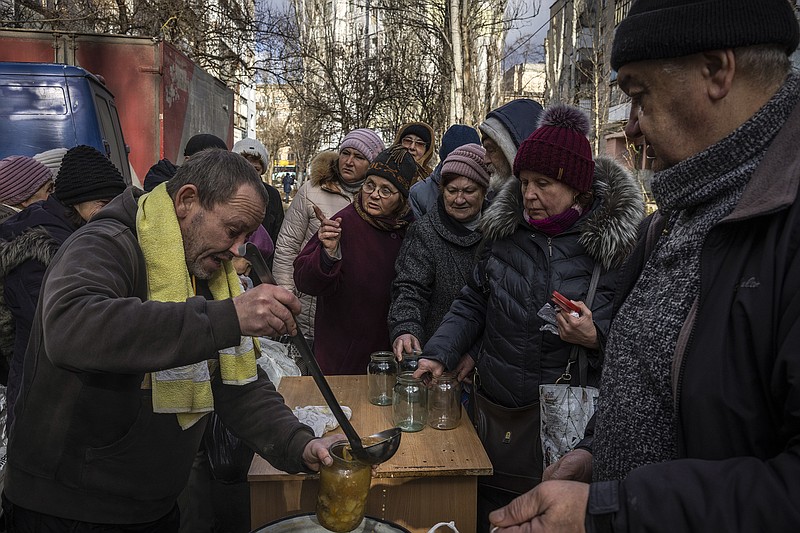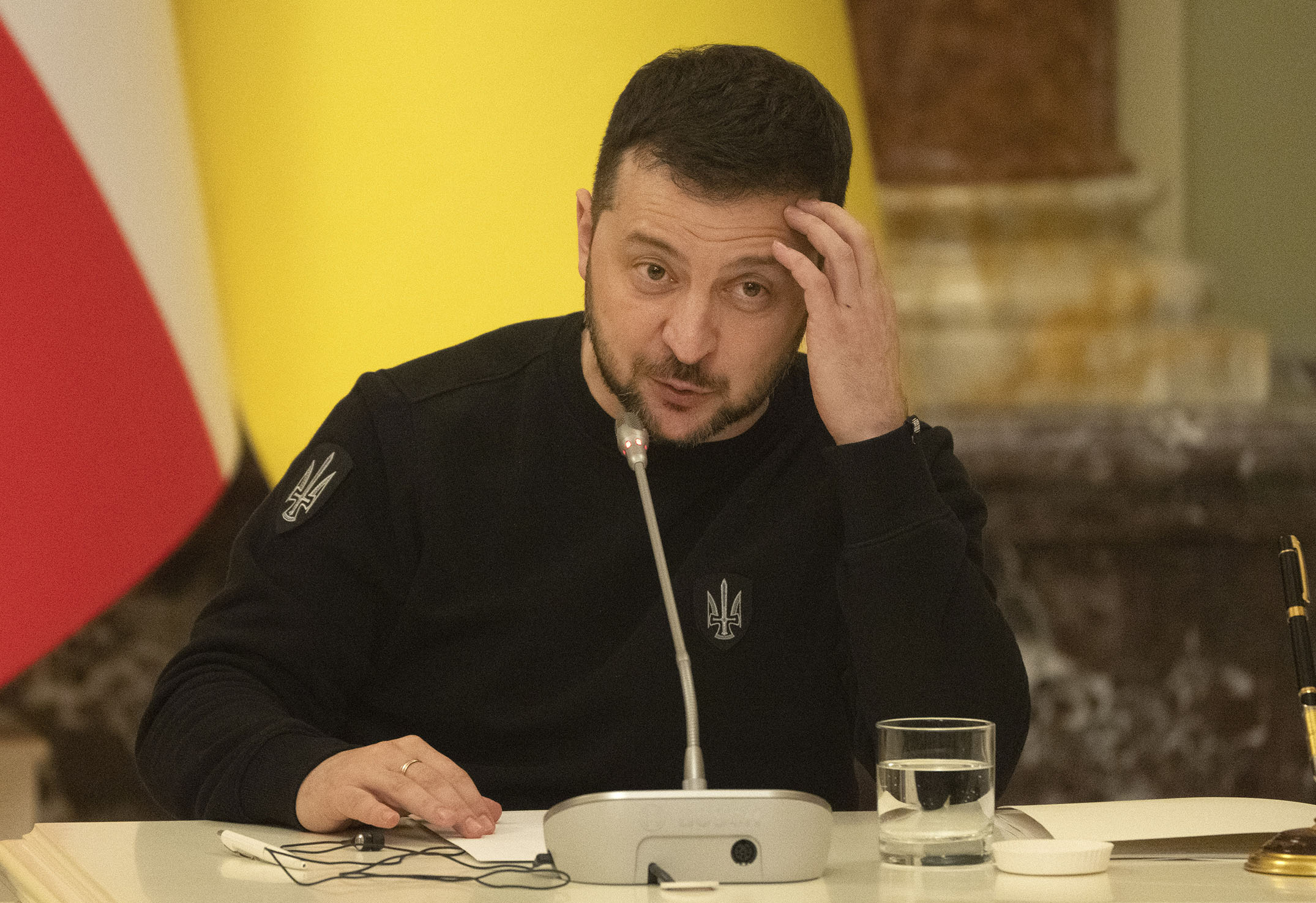KYIV, Ukraine -- Russia is mustering its military might in the Luhansk region of Ukraine, officials said Wednesday, in what Kyiv suspects is preparation for an offensive as the first anniversary of Moscow's invasion approaches.
Also Wednesday, President Volodymyr Zelenskyy's government continued its crackdown on alleged corruption with the dismissal of several high-ranking officials, prominent lawmaker David Arakhamia said.
Zelenskyy was elected in 2019 on an anti-establishment and anti-corruption platform in a country long gripped by graft. The latest allegations come as Western allies are channeling billions of dollars to help Kyiv fight Moscow and as the Ukrainian government is introducing reforms so it can potentially join the European Union one day.
Ukraine's Security Service said on the Telegram messaging app that an operation on Wednesday targeted "corrupt officials who undermine the country's economy and the stable functioning of the defense-industrial complex." It identified one as a former Defense Ministry official accused of embezzling state funds through the purchase of nearly 3,000 bulletproof vests that would inadequately protect Ukrainian soldiers.
Summing up the day's focus on fighting corruption, Zelenskyy declared in his nightly video address Wednesday: "We will not allow anyone to weaken our state."
On the battlefront, a Russian missile destroyed an apartment building in the eastern Donetsk provincial city of Kramatorsk late Wednesday, killing at least two people and wounding at least seven, the regional governor, Pavlo Kyrylenko, reported. Rescuers were searching the building's rubble for other victims. Russia has frequently attacked apartment buildings during the war, causing civilian casualties, although the Kremlin often denies such reports.
Elsewhere, the Kremlin's forces were expelling residents near the Russian-held parts of the front line so they can't tell Ukrainian artillery forces about Russian troop deployments, Luhansk Gov. Serhiy Haidai said.
"There is an active transfer of (Russian troops) to the region and they are definitely preparing for something on the eastern front in February," Haidai said.
The Institute for the Study of War predicted "an imminent Russian offensive in the coming months." Some predict it will coincide with the invasion anniversary on Feb. 24.
The General Staff of the Armed Forces of Ukraine reported Wednesday that Russia was also concentrating in neighboring Donetsk province, especially in its bid to capture the key city of Bakhmut.
Donetsk and Luhansk provinces make up the Donbas, an industrial region bordering Russia that President Vladimir Putin identified as a goal for takeover from the war's outset and where Moscow-backed separatists have fought Ukrainian forces since 2014.
Russian shelling of Bakhmut, from which most residents have fled while others shelter in cellars, killed at least five civilians and wounded 10 on Tuesday, Ukraine's presidential office said.
Kyrylenko posted images of the shelling aftermath, showing huge black holes in residential buildings in the embattled city, reporting that Russia is deploying more troops.
Donetsk was one of four provinces that Russia illegally annexed in the fall, but controls only about half of it. To take the remaining half, Russian forces have no choice but to go through Bakhmut, the only approach to bigger Ukrainian-held cities. Russian forces have been trying for months to capture Bakhmut.
Moscow-installed authorities in Donetsk claimed Russian troops are "closing the ring" around the city. But the Wagner Group, a Kremlin-controlled paramilitary group headed by businessman Yevgeny Prigozhin, on Wednesday denied that Bakhmut was encircled. "When the city is taken, you will certainly know about it," Prigozhin said in an online post.
Elsewhere in the Donbas, the Russians have tried to push back into the city of Lyman, which Ukraine recaptured in October, in one of several recent moves that suggests Moscow may be laying the groundwork for a fresh offensive.
"It cannot be said that there was a large offensive operation, but the Russians are trying to take the initiative," said Col. Sergei Cherevaty, the spokesperson for Ukraine's eastern military command, referring to Lyman.
On the southern edge of the Donetsk region in the Donbas, Russia continues to assault the Ukrainian stronghold of Vuhledar, about 60 miles south of Bakhmut. The city is devoid of people but sits at the intersection of the eastern front in the Donetsk region and the southern front in the Zaporizhzhia region, a location that could prove advantageous for Russian forces trying to resupply troops moving between the two fronts.
russian force at 320,000
Ukraine is keen to secure more Western military aid to fend off much larger Russian forces. It has already won pledges of tanks and now wants more.
Ukrainian intelligence estimates that Russia now has more than 320,000 soldiers in the country -- roughly twice the size of Moscow's initial invasion force. Western officials and military analysts have said Moscow also has 150,000 to 250,000 soldiers in reserve, either training or being positioned inside Russia to join the fight at any time.
"We see that they are preparing for more war, that they are mobilizing more soldiers, more than 200,000, and potentially even more than that," NATO Secretary-General Jens Stoltenberg told reporters during a visit to South Korea on Monday. "They are actively acquiring new weapons, more ammunition, ramping up their own production, but also acquiring more weapons from other authoritarian states like Iran and North Korea."
A surge in Russian bombardment has accompanied the buildup of forces.
Konrad Muzyka, a military analyst for Rochan Consulting, which tracks Russian deployments, said that reported Russian artillery barrages had risen from an average of about 60 per day four weeks ago to more than 90 per day last week. On one day alone, 111 Ukrainian locations were targeted.
He also said that "the Russians are withdrawing a lot of equipment from storage areas." Still, he concurred with other analysts who say that Russia will struggle to outfit large numbers of new soldiers with tanks, armored vehicles and other effective equipment.
Kremlin spokesman Dmitry Peskov described media reports about planned new U.S. military assistance to Ukraine as "a direct path to inciting tensions and taking the escalation to a new level."
"It will require additional efforts on our part, but it won't change the course of events," he told reporters.
In other developments Wednesday:
• David Arakhamia, the head of a parliamentary faction, said several senior officials were targeted in the government's anti-corruption drive. Among those dismissed were Yuri Sotnik, First Deputy Chairman of the State Forest Agency; Alexander Shchutsky, First Deputy Chairman of the State Customs Service; and Andrei Lordkipanidze, Deputy Chairman of the State Service for Food Safety and Consumer Protection, Arakhamia said. In addition, the deputy head of the customs service, Ruslan Cherkassky, has been suspended, according to Arakhamia.
The Security Service of Ukraine said two customs officials in northern Ukraine were placed under house arrest on accusations that they helped illegally import ambulances without paying customs fees. A third target was the former management of oil producing company Ukrnafta and refiner Ukrtatnafta. They were accused of tax evasion and "legalization of funds obtained through criminal means," the Security Service said.
Ukrainian media reported that high-profile anti-corruption raids targeted oligarch Ihor Kolomoisky and former interior minister Arsen Avakov.
• Ukraine's anti-corruption drive is expected to be on the agenda when the European Union's two top officials, Commission President Ursula von der Leyen and Council President Charles Michel, meet with Zelenskyy on Friday. Ukraine's long road toward potential membership of the EU will be a key issue under discussion, with stamping out corruption a key condition.
Information for this article was contributed by Susie Blann, Raf Casert and Hanna Arhirova of The Associated Press and by Marc Santora and Michael Schwirtz of The New York Times.

